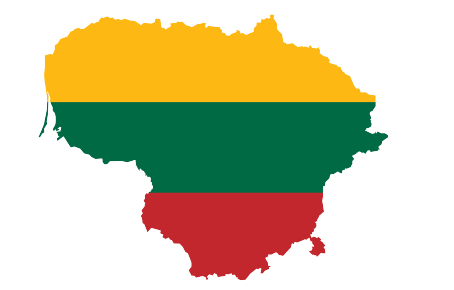Language History
The Lithuanian language belongs to the Baltic group of the Indo-European languages. The Baltic languages were widely spoken until the 15th – 19th centuries. After that, Lithuanian continued to be spoken by “peasants” in the area, while more “prestigious” citizens used German or Polish.
The Baltic languages were restored by the 19th century National Revival even though it was forbidden to print or speak Lithuanian under the Russian Imperial occupation. Linguist Jonas Jablonskis purified the language and established its modern orthography. Lithuanian was heavily influenced by Russian during under the Soviet occupations in the 1940s- 1990s, but following this era, Russian words were eventually omitted from the language.
[/vc_pangea_service_desc_block][/vc_column][/vc_row][vc_row css=”.vc_custom_1621878000851{background-color: #f1f2f0 !important;}” el_class=”bg-grey”][vc_column css=”.vc_custom_1558445967850{margin-top: -90px !important;margin-bottom: -70px !important;}”][vc_pangea_custom_block layout=”center” button_color=”#d15f45″ content_font=”Open Sans” button_popup_form=”” button_text=”Get in Touch” button_link=”url:https%3A%2F%2Fportal.stg-wpml.pangea.global%2Frequest-quote%2F|||”]There are approximately 3 million Lithuanian speakers around the world. Around 2.8 million speakers reside in Lithuania. (Source: mustgo.com)
[/vc_pangea_custom_block][/vc_column][/vc_row][vc_row css=”.vc_custom_1557920359208{margin-bottom: -50px !important;background-color: #ffffff !important;}”][vc_column css=”.vc_custom_1593181560434{margin-top: -50px !important;margin-bottom: -10px !important;}”][vc_pangea_custom_block layout=”center” heading_font=”Futura Std” content_font=”Open Sans” title=”Where is Lithuanian Spoken?”]Lithuanian is the national language of Lithuania; however, it is also spoken in other countries including Latvia, Estonia, Poland, Canada, and the US.
Amharic is the second most spoken Semitic language in the whole[/vc_pangea_custom_block][/vc_column][/vc_row][vc_row css=”.vc_custom_1627288734422{margin-top: -10px !important;padding-top: 50px !important;background-color: #f1f2f0 !important;}” el_class=”bg-grey”][vc_column css=”.vc_custom_1593181229582{margin-top: -40px !important;margin-bottom: -10px !important;}”][vc_pangea_quote_block font=”Futura Std” quote_text=”“This language is like the chirping of birds – beautiful, but not easy to imitate.” Anna, Poland”][/vc_column][/vc_row][vc_row css=”.vc_custom_1593181467881{background-color: #ffffff !important;}”][vc_column css=”.vc_custom_1593181212528{margin-top: -50px !important;margin-bottom: -20px !important;}”][vc_pangea_custom_block layout=”center” title=”4 Easy Phrases in Lithuanian! “][/vc_pangea_custom_block][/vc_column][/vc_row][vc_row content_placement=”middle” css=”.vc_custom_1593180492203{background-color: #ffffff !important;}”][vc_column css=”.vc_custom_1593180596126{margin-top: -50px !important;margin-bottom: 20px !important;}”][vc_wp_text title=” “]
| Lithuanian | English |
|---|---|
| Labas | Hello |
| Ačiū | Thank you |
| Viso | Goodbye |
| Kaip sekasi? | How are you? |
Lithuania Population:
2,722,289
Internet Users:
2,599,678
Penetration:
90.8%
As of 2020. Source:
www.internetworldstats.com
• Nouns have 7 cases (as well as 2 more that are rarely used) – nominative, genitive, dative, accusative, instrumental, locative, vocative.
• There are 3 tenses (for verbs) and two genders in the Lithuanian language (masculine & feminine).
• The Lithuanian language has no articles.
• Lithuanian is a pro-drop language – e.g. pronouns are usually emitted as the verb form carries information about the person and number (source. Mustgo.com).
• Lithuanian sentences are structured using the Subject-Verb-Object order, but other word orders are possible, too.[/vc_pangea_custom_block][/vc_column][/vc_row][vc_row css=”.vc_custom_1593180516491{background-color: #f1f2f0 !important;}”][vc_column css=”.vc_custom_1558438241711{margin-top: -50px !important;}”][vc_pangea_custom_block layout=”center” content_font=”Open Sans”]Are you looking for professional Lithuanian translation services? Get in touch with Pangea Global! We’ll hook you up with one of our professional linguists who will provide you with accurate and reliable Lithuanian localization services, copywriting, voice overs and more![/vc_pangea_custom_block][/vc_column][/vc_row][vc_row css=”.vc_custom_1593180525994{background-color: #f1f2f0 !important;}”][vc_column css=”.vc_custom_1557924920503{margin-top: -30px !important;margin-bottom: 40px !important;}”][vc_pangea_cta_button button_text=”Get In Touch” button_link=”url:https%3A%2F%2Fstg-wpml.stg-wpml.pangea.global%2Fquote%2F|||”][/vc_column][/vc_row]




